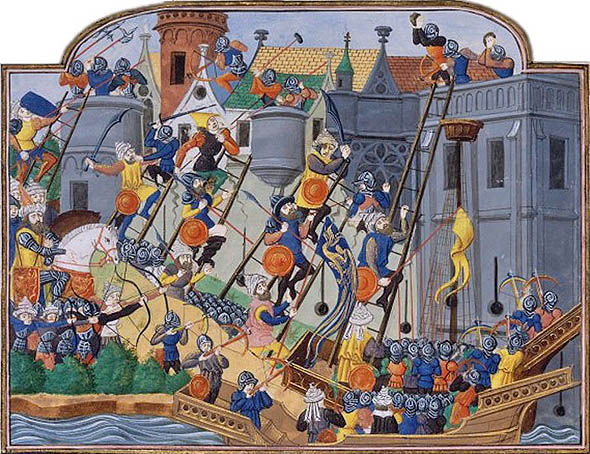Turkey’s Continuing Siege: Remembering the Fall of Constantinople
29 May 2014Today marks the 561st anniversary of the fall and capture of the magnificent Christian city of Constantinople, the eastern capital of the Roman Empire, to the forces led by the Ottoman Turkish Sultan, Mohammed (Mehmet) II. Mehmet took the title “the Conqueror” for himself, as a sign of the Turks’ conquest of what was Europe’s most glorious city of the Middle Ages and as recognition of the Ottoman jihadi victory over Christianity.
Nearly half a millennium later, the government of the Republic of Turkey continues to celebrate the fall of the city, today’s Istanbul, with religious, sports, and media festivities. Kemalist governments long understood the fall of Constantinople as a signature event for Turkish nationalism. Visitors to Istanbul on May 29th could hardly mistake the nationalist message of the city draped in Turkish flags for as far as the eye could see, and under the current Islamist government of Prime Minister Recep Tayyip Erdogan, secular nationalism has been augmented with a religious message about the fall of Constantinople as a sign of Islam’s triumph over Christianity.
Last year, Erdogan floated the idea of designating May 29th as a Turkish national holiday. More recently, he suggested the possibility of a referendum on the conversion of the historic Byzantine Christian Cathedral of Hagia Sophia, captured by Mehmet when he rode on horseback through the colossal entry doors into the heart of the sanctuary, from its current status as a museum into a functioning mosque.
Ankara has consistently critiqued the European Union as a Christian Club keeping Turkey at arm’s length because of religious prejudice against Islam. Yet, the fall of Constantinople on May 29th in 1453 began an unrelenting, centuries-long pattern of persecution and discrimination against the city’s Christian population. This policy of religious cleansing lays bare the lie of the Ottoman Empire as a benign, multi-cultural polity, and also highlights the violations of human rights and religious freedom that are the hallmark of Turkey’s treatment of its Christian minority populations. The anniversary of the fall of Constantinople is a reminder that the siege against Turkey’s Christians continues to this day — most egregiously, against the Ecumenical Patriarchate and the tiny Greek Orthodox Christian community (fewer than 2,000 in number), as well as against the small Armenian Orthodox and Syriac Orthodox Christian communities (their combined numbers total about 80,000). All of these Christians are survivors tracing their roots to Constantinople when it fell to the Ottoman Turks.
The erasure of Christians from Constantinople (located on the ancient city of Byzantion on the southernmost promontory of the European side of the Bosporus) is one of the tragedies of history. When the Ottomans began their 54-day siege of Constantinople, the city was still renowned throughout Europe for its size, wealth, and cosmopolitan sophistication. Even after the disintegrated Western Roman Empire had been resuscitated by Charlemagne as the Holy Roman Empire, the capital city of the Eastern Roman, or Byzantine, Empire had a population numbering nearly one million, and was the repository of Medieval Europe’s art, ancient literature, and the birthplace of the hospital and the university. And long after the Christian Sees of Antioch, Alexandria, and Jerusalem had fallen to Arab Muslim armies moving westward through the Levant and the Holy Lands of Christianity’s origins, Constantinople stood as reminder that the epicenter of Christian theology and practice was in the eastern territories of the Roman Empire — only the See of Rome lay in western imperial lands. When the Great Schism split Christendom into the Greek Orthodox East and Roman Catholic West, Constantinople’s Christians were largely alone on the frontlines when the Ottoman Turks began their assault the city.
The Ottomans’ capture of Constantinople was the final blow marking the end of the world’s most long-lived polity, the Roman Empire. In the former Byzantine East, Christians found themselves living in an Islamic theocracy, rendered second-class subjects of the Ottoman Sultan: as dhimmi, they were accorded formal status as protected “Peoples of the Book,” and as a religious community, the Christian millet was overseen by the Ecumenical Patriarch. But in reality, Christians in the Ottoman Empire were treated as chattel, and were subjected to all manner of persecution and exploitation: most notably, the infamous devershirme was a system of forcible conscription-conversion of Christian children as a form of human tax for the Ottoman state.
The conventional portrayal of Mustapha Kemal Ataturk, the founder of modern Turkey, has been built on the political canard that the secularist principles of the Republic of Turkey were a deliberate turn away from the Islamic theocracy of the Ottoman Empire. The reality is quite different. In fact, Turkey’s founding moment involved the genocide of two-and-a-half million Armenian, Assyrian, and Greek Christians in Ottoman Anatolia and Asia Minor–in short, most of the remaining Orthodox Christian population that had survived from Byzantine Christian times.
In some ways, Ankara’s policies against Turkey’s Christian citizens have added a modern veneer and sophisticated brutality to Ottoman norms and practices. Pogroms, persecution, and discrimination have been visited on Turkey’s Christians. The Turkish press revealed only weeks ago that Ecumenical Patriarch Bartholomew was the target of an assassination conspiracy (the second such plot against his life in four years), and the constant threats and interference in the affairs of the Ecumenical Patriarchate and the Greek Orthodox community have led to the near extinction of that ancient Christian community. In the words of an anonymous Church hierarch in Turkey fearful for the life of his flock, Christians in Turkey are an endangered species. The siege of Constantinople continues today, 561 years after the fall on May 29th, 1453.
Dr. Elizabeth H. Prodromou is Affiliate Scholar at the Center for European Studies at Harvard University and former Vice Chair of the US Commission on International Religious Freedom; Dr. Alexandros K. Kyrou is Prof. of History at Salem State University, where he teaches on Byzantium, the Balkans, and the Ottoman Empire







